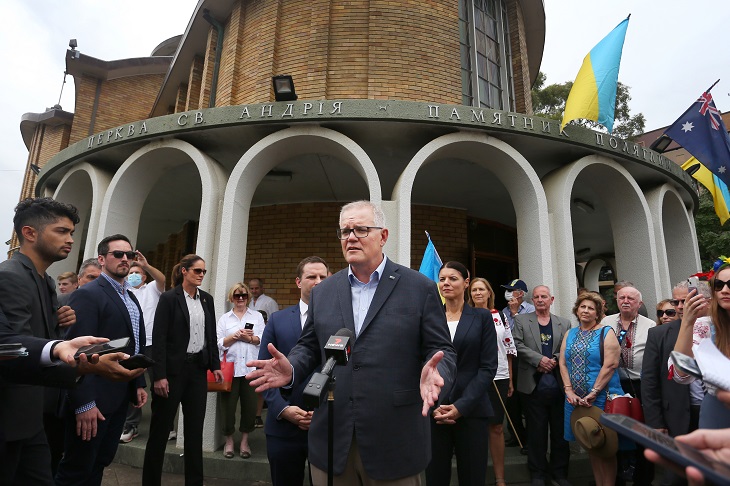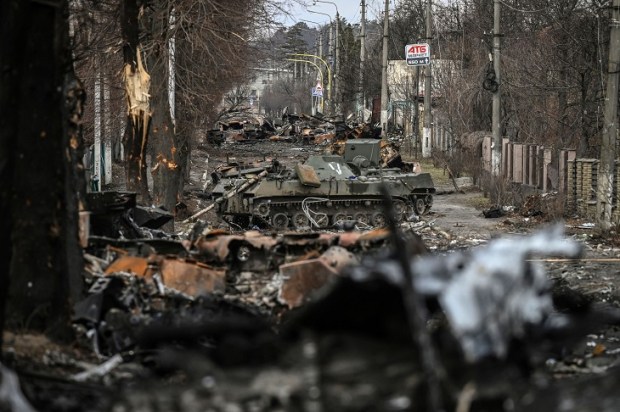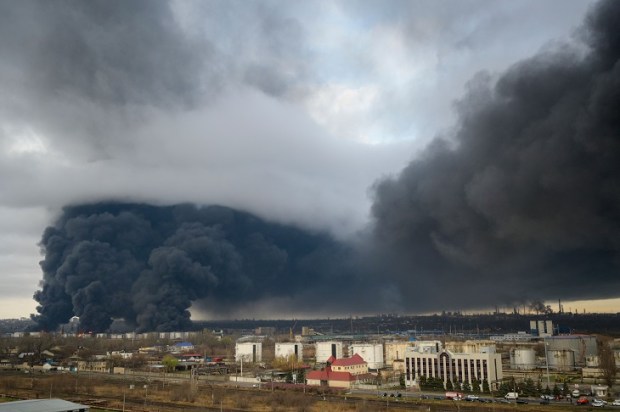On Sunday morning, Prime Minister Scott Morrison attended church as he very often does. Except yesterday, it was at a Ukrainian church in western Sydney and it was where he changed Australia’s approach to Putin’s invasion of Ukraine.
The change is very welcome, if not overdue, to those who have long argued that Putin’s aggression must be met with full force rather than half-measures. While details are awaited, the new policy includes military aid – both lethal and non-lethal equipment via our Nato partners – and direct sanctions on Vladimir Putin and Sergey Lavrov, his Foreign Minister.
And just as the government has appropriately stepped up, it’s also a prompt: Australian policy vis-à-vis Putin and Ukraine can change further for our strategic advantage.
In their best interests, it is time for Western liberal democracies, including Australia, to not only help protect Ukraine but directly pursue regime change in Moscow. This is a historical moment to remove the world’s greatest dictator, who is now likely operating from psychosis. In short, Australia must make a choice about Ukraine.
Let’s step back first. Until Sunday, the thrust of the Morrison government’s policy was limited and graduated sanctions against eight oligarchs and the Russian Duma’s members. It was a minimalist approach, seemingly designed to meet our allies’ expectations. It was likely to have very little substantive impact on events. I will be unpopular for saying so: such an approach very much reflected the Department of Foreign Affairs and Trade’s (DFAT) establishmentarian and ‘real politik’ DNA.
Frankly, an extraordinary situation was met with some pretty ordinary thinking. Some Australian policy advisors went to the lazy default settings of ‘it’s a long way away and really European’, ‘we can’t make a difference’, ‘it could damage our economy’ and ‘it will just escalate things’ (as if Putin hasn’t unilaterally done exactly that).
Morrison deserves credit for exerting leadership when it is truly needed to check such stagnant views. He joins his colleague President Zelenskyy in Ukraine (a Jew who, according to Putin, heads a drug-addicted Nazi junta), in showing how ‘cometh the moment cometh the man’.
If nothing else, the Australians lost on MH17 directly because of Putin’s actions would have died in vain if we had continued to dither and delay. Thankfully, we no longer are.
In the meantime, other nations were and are: a) providing Ukraine with direct military and other practical aid, including the air defence and anti-tank technologies that are keeping Ukraine in the fight, and; b) imposing substantive sanctions directly on Putin and his closest enablers. They are now also moving to basically kill Russian banking capacity via SWIFT closure and restrictions on its central bank.
It is only logical that Australia has joined this seeming alliance of action. It looks to be working; military technology is playing a very significant role in Ukraine’s five days of extraordinary and courageous defence against Putin’s forces. With Javelins and Stingers – and citizens’ Molotovs – there are signs the brave Ukrainians may even turn the brutal tide unleashed against them.
As they do, in its own interests, Australia could and should rapidly adopt a further and pro-active strategy in concert with its allies. A strategy to remove the greatest threat to global security and stability, economic progress, and democratic values – Vladimir Putin.
Such a regime change strategy would build on the new order that is emerging. That order features: a) new Nato and European unity; b) explicit reaffirmation of the espoused values of liberal democracy, and; c) clear understanding that Putin’s threat is not limited to one peaceful neighbour, but globally extends on geopolitical, economic, and ideological bases.
Indeed, it’s time to turn this situation from risk mitigation to strategic advantage. It’s time to use this historic moment for western liberal democracies and Australia to seek the removal of Vladimir Putin from power. It is unlikely that there will ever again be a moment when:
- Western liberal democratic allies and their voting populations have a strong consensus.
- Democratic values require defence from autocracy and, frankly, neo-fascism – primarily in the form of Putin, but also others such as the PRC and Islamist terrorists.
- Putin himself is making vast mistakes, such as his bungled blitzkrieg.
- Putin is under stronger pressure from (also brave) Russian domestic sources.
- Russian commanders are taking the greatest single day of casualties among their young and inexperienced troops in Russian history (yes, all of it).
- Russian supply lines look to further collapse in the next two weeks, and Putin’s tactics become more desperate.
Why act?
We have a massive economic interest in the global stability which Putin has decided to destroy via Ukraine. Stability isn’t achieved by letting Putin continue to roll across Europe, albeit badly and with disastrous consequences to his own troops and people.
Also, if we resile from greater action, we should expect the Kremlin to be further motivated and empowered. Putin preys on weakness. In addition to his probable personality disorder, it is part of his training as a KGB officer. He looks to find our blind-spots, like losing sight of our values, and exploits them.
Further, Australia can make a meaningful difference. The first stage of regime change in Moscow is protecting Ukraine. Most Australians would not know that Australia has significant soft power in Ukraine, partly stemming from the MH17 tragedy. It is affectionately regarded by all and has huge credibility. I say this from personal experience of having voluntarily worked with government reformers in Kyiv: Australia’s presence motivates those who risk their lives for our values and our security.
How to act?
First, Australia can be part of further financially and psychologically isolating Vladimir Putin and his enablers. Beyond the current suite of actions, this can take many concrete forms such as: full travel bans on Russian citizens; automatic FIRB rejections; prohibitions on sale of luxury assets and real estate, including on the Gold Coast, by Russian citizens; blocking the credit cards of Russian banks; and sending the Ambassador back to a Moscow winter.
Second, Australia can be a further part of operationally tipping the balance against Putin in Ukraine and humiliating him before his own people. In addition to the practical aid now on the way, that means being part of enforcing a ‘no fly zone’ over Ukraine. The CNN generals agree: the Ukrainians are showing their battlefield skills, experience and determination in unprecedented ways and, with some more support, can actually defeat or stalemate their unmotivated enemy.
Thirdly and very importantly, there needs to be an unprecedented international communications and digital offensive that counters Putin’s massive propaganda machine. It is time to fight for hearts and minds in the name of global democracy. Our values can no longer be taken for granted as we distract ourselves with debating marginal issues from positions of privilege and moral relativism.
The primary audience for such an informational Marshall Plan would be Putin’s fact-deprived and information-oppressed nation. It would only be proportionate to do so. Let’s remember that Putin’s paid troll factories have tried to spread deadly diseases – through no-vax campaigning – in our own midst; we are yet to even proportionately reply. That cannot go on.
The world can be rid of Vladimir Putin. Australia can be part of getting rid of him. It would suit our stability, security, economy, and our values. It’s up to us to choose.
Got something to add? Join the discussion and comment below.
Get 10 issues for just $10
Subscribe to The Spectator Australia today for the next 10 magazine issues, plus full online access, for just $10.

























Comments
Don't miss out
Join the conversation with other Spectator Australia readers. Subscribe to leave a comment.
SUBSCRIBEAlready a subscriber? Log in